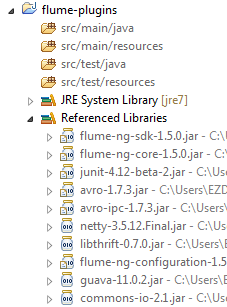package me.xingwu.flume.plugins;
import java.io.IOException;
import java.nio.charset.Charset;
import java.text.ParseException;
import java.text.SimpleDateFormat;
import java.util.ArrayList;
import java.util.Arrays;
import java.util.Date;
import java.util.List;
import java.util.Map;
import javax.xml.stream.XMLInputFactory;
import javax.xml.stream.XMLStreamConstants;
import javax.xml.stream.XMLStreamException;
import javax.xml.stream.XMLStreamReader;
import org.apache.flume.Context;
import org.apache.flume.Event;
import org.apache.flume.annotations.InterfaceAudience;
import org.apache.flume.annotations.InterfaceStability;
import org.apache.flume.event.EventBuilder;
import org.apache.flume.serialization.EventDeserializer;
import org.apache.flume.serialization.ResettableInputStream;
import org.slf4j.Logger;
import org.slf4j.LoggerFactory;
import com.google.common.base.Joiner;
import com.google.common.collect.Lists;
import com.google.common.collect.Maps;
@InterfaceAudience.Private
@InterfaceStability.Evolving
public class MyXMLDeserializer implements EventDeserializer {
private static final Logger logger = LoggerFactory.getLogger(MyXMLDeserializer.class);
private final ResettableInputStream in;
private XMLStreamReader r;
private final Charset outputCharset;
private final String nullData;
private volatile boolean isOpen;
private int generalColumnsIndex = -1;
private boolean inMdScope = false, inMvScope = false;
private String firstColName = "";
private String moid = "";
private List<String> dataCols;
private List<String> generalCols;
private final List<String> generalColNames;
private static final String MYXML_MD_ELEMENT = "md";
private static final String MYXML_MV_ELEMENT = "mv";
private static final String MYXML_MT_ELEMENT = "mt";
private static final String MYXML_MOID_ELEMENT = "moid";
private static final String MYXML_R_ELEMENT = "r";
public static final String OUT_CHARSET_KEY = "outputCharset";
public static final String CHARSET_DFLT = "UTF-8";
public static final String GENERAL_COLUMNS = "generalColumns";
public static final String GENERAL_COLUMNS_DFLT = "neun,nedn,nesw,mts,gp";
public static final String NULL_DATA = "nullData";
public static final String NULL_DATA_DFLT = "\\N";
MyXMLDeserializer(Context context, ResettableInputStream in) {
this.in = in;
this.isOpen = true;
this.outputCharset = Charset.forName(context.getString(OUT_CHARSET_KEY, CHARSET_DFLT));
this.nullData = context.getString(NULL_DATA, NULL_DATA_DFLT);
this.generalColNames = new ArrayList<String>(Arrays.<String> asList(context.getString(
GENERAL_COLUMNS, GENERAL_COLUMNS_DFLT).split(",")));
XMLInputFactory inputFactory = XMLInputFactory.newInstance();
try {
r = inputFactory.createXMLStreamReader(new FlumeInputStream(in));
} catch (XMLStreamException e) {
logger.error("createXMLStreamReader failed: " + e.getMessage());
this.isOpen = false;
}
}
* Reads a XML file as a single event
*
* @return Event containing parsed line
* @throws IOException
*/
@Override
public Event readEvent() throws IOException {
logger.error("Reading a single event from a XML stream is not supported! Try readEvents()!");
return null;
}
* Batch line read
*
* @param numEvents
* Maximum number of events to return.
* @return List of events containing read lines
* @throws IOException
*/
@Override
public List<Event> readEvents(int numEvents) throws IOException {
List<Event> events = Lists.newLinkedList();
ensureOpen();
String output = "";
try {
int event = r.getEventType();
while (true) {
switch (event) {
case XMLStreamConstants.START_DOCUMENT:
break;
case XMLStreamConstants.START_ELEMENT:
String strEleName = r.getName().getLocalPart();
if (inMdScope) {
if (inMvScope) {
if (strEleName.equals(MYXML_MOID_ELEMENT)) {
moid = r.getElementText();
} else if (strEleName.equals(MYXML_R_ELEMENT)) {
String dataCell = r.getElementText();
if (dataCell == null || dataCell.isEmpty()) {
dataCell = this.nullData;
}
dataCols.add(dataCell);
}
} else if (strEleName.equals(MYXML_MV_ELEMENT)) {
inMvScope = true;
dataCols = new ArrayList<String>();
} else if (strEleName.equals(MYXML_MT_ELEMENT)) {
if (firstColName.isEmpty()) {
firstColName = r.getElementText();
}
} else {
generalColumnsIndex = generalColNames.indexOf(strEleName);
if (generalColumnsIndex >= 0
&& generalColumnsIndex <= generalColNames.size()) {
generalCols.set(generalColumnsIndex, r.getElementText());
}
}
} else if (strEleName.equals(MYXML_MD_ELEMENT)) {
inMdScope = true;
generalCols = new ArrayList<String>(generalColNames);
}
break;
case XMLStreamConstants.CHARACTERS:
break;
case XMLStreamConstants.END_ELEMENT:
String strEndEle = r.getName().getLocalPart();
if (strEndEle.equals(MYXML_MD_ELEMENT)) {
inMdScope = false;
firstColName = "";
} else if (strEndEle.equals(MYXML_MV_ELEMENT)) {
inMvScope = false;
output = Joiner.on("|").useForNull(this.nullData).join(generalCols) + "|"
+ moid + "|"
+ Joiner.on("|").useForNull(this.nullData).join(dataCols);
Event objEvent = EventBuilder.withBody(output, outputCharset);
Map<String, String> headers = generateHeaders(generalColNames, generalCols);
headers.put("firstCol", firstColName);
objEvent.setHeaders(headers);
events.add(objEvent);
moid = "";
}
break;
case XMLStreamConstants.END_DOCUMENT:
break;
}
if (!r.hasNext())
break;
event = r.next();
if (events.size() >= numEvents) {
break;
}
}
} catch (XMLStreamException e) {
logger.error(e.getMessage());
}
return events;
}
@Override
public void mark() throws IOException {
ensureOpen();
in.mark();
}
@Override
public void reset() throws IOException {
ensureOpen();
in.reset();
}
@Override
public void close() throws IOException {
if (isOpen) {
reset();
in.close();
try {
r.close();
} catch (XMLStreamException e) {
logger.error("XML close error: " + e.getMessage());
}
isOpen = false;
}
}
private Map<String, String> generateHeaders(List<String> keys, List<String> values) {
Map<String, String> map = Maps.newHashMap();
for (int i = 0; i < keys.size(); i++) {
if (keys.get(i).equals("mts")) {
Date d;
try {
d = (new SimpleDateFormat("yyyyMMddHHmmssX").parse(values.get(i)));
map.put("timestamp", String.valueOf(d.getTime()));
} catch (ParseException e) {
logger.error("Parse timestamp error: " + e.getMessage());
}
} else {
map.put(keys.get(i), values.get(i));
}
}
return map;
}
private void ensureOpen() {
if (!isOpen) {
throw new IllegalStateException("Serializer has been closed");
}
}
public static class Builder implements EventDeserializer.Builder {
@Override
public EventDeserializer build(Context context, ResettableInputStream in) {
return new MyXMLDeserializer(context, in);
}
}
}

